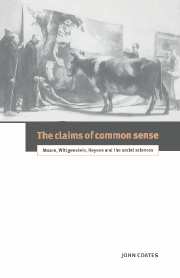Book contents
- Frontmatter
- Contents
- Preface
- Introduction
- 1 A short history of common sense
- 2 Ideal languages and vague concepts: the transition in Cambridge philosophy
- 3 Keynes and Moore's common sense
- 4 Keynes's later views on vagueness and definition
- 5 Samples, generalizations, and ideal types
- 6 The Cambridge philosophical community
- Conclusion: complexity, vagueness, and rhetoric
- Index
2 - Ideal languages and vague concepts: the transition in Cambridge philosophy
Published online by Cambridge University Press: 19 September 2009
- Frontmatter
- Contents
- Preface
- Introduction
- 1 A short history of common sense
- 2 Ideal languages and vague concepts: the transition in Cambridge philosophy
- 3 Keynes and Moore's common sense
- 4 Keynes's later views on vagueness and definition
- 5 Samples, generalizations, and ideal types
- 6 The Cambridge philosophical community
- Conclusion: complexity, vagueness, and rhetoric
- Index
Summary
In the next few chapters I sketch out how the conflicting demands of common sense and a canonical notation played themselves out in Cambridge philosophy between the Wars. The focus is on Moore, Wittgenstein, and Keynes, although in later chapters Ramsey and Sraffa are also brought in to the discussion. The account of the transition in Cambridge philosophy of necessity must be highly selective, and it will deal exclusively with the idea of an ideal language in early logical atomism, and on how Wittgenstein's later rediscovery of the property of vagueness challenged this notion. Much of later Cambridge philosophy chose the opposite route to that taken by Quine in balancing the demands of a canonical notation with those of common sense, and Keynes in particular indicated a position which nicely focuses the debate on whether vague concepts simplify or complicate theoretical activity.
AN IDEAL LANGUAGE
There were various schools of analysis but they all shared the practice of rewriting philosophically puzzling statements in more precise language. Wittgenstein pointed out that the origin of this method lay in the fascination with a single form of explanation: the common practice of substituting one expression for another in order to clear up a misunderstanding was taken as a paradigm case of problem solving; and “this,” he wrote, “may be called an ‘analysis’ of our forms of expression, for the process is sometimes like one of taking a thing apart.
- Type
- Chapter
- Information
- The Claims of Common SenseMoore, Wittgenstein, Keynes and the Social Sciences, pp. 39 - 61Publisher: Cambridge University PressPrint publication year: 1996



